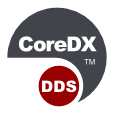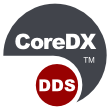Announcing CoreDX DDS v5.0
 |
Phone: 720.733.7906 Fax:866.725.4485 230 Third Street, Suite 260 Castle Rock, CO 80104 contact@twinoakscomputing.com www.twinoakscomputing.com |
 |
Announcing CoreDX DDS v5.0 CoreDX DDS v5.0 contains a number of exciting enhancements for our users, including exciting new language bindings, new features and performance enhancements, and better interoperability. Here are some highlights: 'Modern' C++ Language Binding The Modern C++ (Cxx) DDS language binding makes use of typical C++ constructs to provide a streamlined DDS API. C++ programmers may find this new DDS API is more natural to use for their C++ DDS applications. CoreDX DDS v5.0 now offers 2 different C++ language bindings:
Python Language Binding The Python language continues to gain popularity and is now considered tied for the second most used programming language across the world (RedMonk 2020). Twin Oaks Computing is excited to provide the power of standardized DDS communications to Python developers. CoreDX DDS v5.0 offers a complete language binding, with the full range of data type definitions and QoS configurations found in other language bindings. This allows our customer base to extend their use of DDS to new components of existing systems, and quickly develop DDS tools and prototypes using Python. Java Script Language Binding CoreDX DDS v5.0 supports JavaScript NodeJS applications. Making use of the DDS XML Application Definition, JavaScript programmers can utilize the full power of CoreDX DDS within their NodeJS applications and be fully interoperable with other DDS components. The new language bindings in CoreDX DDS v5.0 allow our customers to use DDS in more components and environments than ever before. Performance Improvements Our engineering team continuously monitors CoreDX DDS performance and resource utilization to ensure consistent behaviors to our customers, and they occasionally find places to dramatically improve either performance or resource utilization. We are pleased to include one such enhancement to the latency and throughput performance of dynamic types. Customers using dynamic types, particularly those with large sequence or arrays, will find performance improvements with CoreDX DDS v5.0. DDS Application Definition in XML CoreDX DDS v5.0 supports the recently standardized DDS application XML formats. This allows customers to move a significant amount of DDS initialization and configuration from compiled code to XML configuration files. The DDS entities, their QoS policies, and data types may all be defined in XML. CoreDX DDS contains a simple API to load and access those configured DDS entities, receive notifications, and read and write data. The XML application definition and API allows customers to very quickly develop DDS applications, and to make changes to DDS entities and data types without recompiling any code. Flexible Crypto Library Support (with CoreDX DDS Secure) Our customers deploy CoreDX DDS Secure into a wide range of environments, with a variety of constraints and requirements with respect to performance, resource availability, and customer security demands. CoreDX DDS v5.0 provides customers multiple interoperable crypto library options (including the popular OpenSSL and WolfSSL). Customers may also select alternative crypto library options to meet their specific needs. Better Interoperability with other DDS Implementations DDS brings standardized interfaces to large and complex distributed systems. The use of DDS in industry-specific standardized architectures continues to grow, making use of new combinations of data types and DDS protocol features, and resulting in improvements to DDS standards, particularly to data encoding rules. CoreDX DDS v5.0 has adapted to the latest versions of the DDS standards and to real-world interoperability use cases. Contact us to learn more about CoreDX DDS v5.0. Download your free 30 day evaluation.
|







